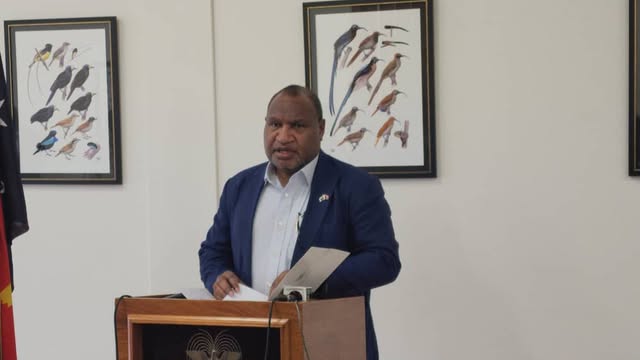The Prime Minister touched down at the Jackson International Airport this morning where he made his way to the APEC Terminal and gave an update on the trip that he took to New Zealand (NZ), which he said was a very successful one.
Addressing the media at the terminal, he said the visit saw productive discussions and enhanced bilateral relations, focused on economic cooperation, labour mobility, agriculture, education, and state-owned enterprise reforms.
Strengthening Bilateral Relations
Prime Minister James Marape’s official visit to New Zealand commenced with a high-level bilateral
meeting held in the New Zealand Parliament in Wellington with New Zealand Prime Minister
Rt. Hon. Christopher Luxon. The discussions culminated in the signing of a Statement of
Partnership for 2025–2029, aimed at bolstering economic, political, and cultural ties
between the two nations, while providing a strategic roadmap for collaboration in various
sectors.
“Upon arrival, the Prime Minister and I had a good bilateral meeting in the Parliament that
concluded with the signing of the Statement of Partnership for 2025–2029,” said Prime
Minister Marape.
He added, “Both Prime Minister Luxon and I agree that there must be a step up. We also
agreed that the Statement of Partnership is a living document… we must work so that we
can be mutually beneficial to the relationship we have.”
The Prime Minister also engaged in constructive discussions with New Zealand’s Deputy
Prime Minister and the Opposition Leader, emphasizing the bipartisan approach of the New
Zealand Government in its engagements with Papua New Guinea. The series of meetings
reflected New Zealand’s commitment to strengthening its relationship with Papua New
Guinea at all levels of government.
Labour Mobility and Economic Opportunities
A major focus of the visit was the enhancement of labour mobility between Papua New
Guinea and New Zealand. Presently, over 600 Papua New Guineans are employed under
New Zealand’s seasonal work schemes, earning approximately K50,000 annually. Prime
Minister Marape highlighted the potential to expand this number to over 10,000 in the
coming years.
“We will continue working with both Australia and New Zealand to create more
opportunities for our youth,” he stated.
The Prime Minister shared positive feedback from New Zealand employers who praised the
diligence and productivity of Papua New Guinean workers.
“I pitched for the space and the report we got from a couple of employers we had contact with was that Papua New Guineans working there are hard workers, productive workers and a good report we
received.”
Additionally, the New Zealand Government expressed interest in collaborating with Papua
New Guinea to enhance its agricultural export standards, particularly for tropical produce
such as coffee and cocoa.
Agriculture and Livestock Collaboration
Prime Minister Marape was particularly impressed by New Zealand’s agricultural success,
noting that agriculture, livestock, and fisheries contribute between 60% and 70% of New
Zealand’s economy. The Prime Minister remarked on the vast potential Papua New Guinea
possesses but has yet to fully harness, particularly in agriculture and livestock.
“These potentials we have in PNG… but we face challenges at various levels of
governance,” he noted.
Discussions were also held to enhance collaboration between the Livestock Improvement
Corporation of New Zealand and Papua New Guinea’s Livestock Development
Corporation, aimed at boosting local livestock production and developing sustainable
agricultural practices.
“We are a country bigger than New Zealand by over 100,000 square kilometres. But, our
livestock is under 50,000. We are closest to the biggest beef-eating nation, that’s Indonesia
next door. Yet for so long we’ve just been focusing on oil and gold and gas and not
focusing on key areas that could anchor the economy,” Prime Minister Marape stated.
Technical Expertise and Infrastructure Development
A key outcome of the visit was Prime Minister Marape’s request for technical expertise from New
Zealand to enhance the efficiency of Papua New Guinea’s State-Owned Enterprises (SOEs). He
proposed the appointment of independent directors from New Zealand to contribute their expertise
to sectors such as power, water, telecommunications, and airlines.
“I’ve asked for about five technical experts especially to be inserted at our board level in our power
company, in our water company, in our telco company and in our airline company,” he stated.
Humanitarian Efforts and Educational Collaboration
Prime Minister Marape acknowledged the continuous support provided by New Zealand-based
NGOs, including the Fred Hollows Foundation, which has been actively working in Papua New
Guinea. He also noted a substantial investment by New Zealand in developing a world-class eye
clinic at the Port Moresby General Hospital, which is expected to benefit thousands of Papua New
Guineans.
He also met over 50 Papua New Guinean students studying under New Zealand Government
scholarships and expressed his desire to increase these opportunities. “I pitched very high in New
Zealand that I’m going to send more kids to study there,” Prime Minister Marape said, stressing the
importance of education and collaboration between the two nations.
Enhancing Regional Relations
Prime Minister Marape emphasized that Papua New Guinea’s position as a respected regional
partner has been strengthened by its continued commitment to democracy and engagement with
neighbouring countries. As Papua New Guinea approaches its 50th anniversary of independence,
the Prime Minister stressed the significance of building stronger ties with New Zealand and other
regional partners.
“They appreciate who we are in our region… seen from the context of Pacific Nation that bridges
Southeast Asia and Asia,” Prime Minister Marape said.
He further noted, “No longer is PNG seen from a lower perspective. We are seen from an equal
regional partnership perspective. Our views in the region are taken on board seriously and we are a
valued partner in the region.”
The visit is expected to pave the way for deeper economic, educational, and humanitarian
collaboration between Papua New Guinea and New Zealand, contributing to mutual growth and
regional stability.


1 Comment
Pingback: dlvr.it